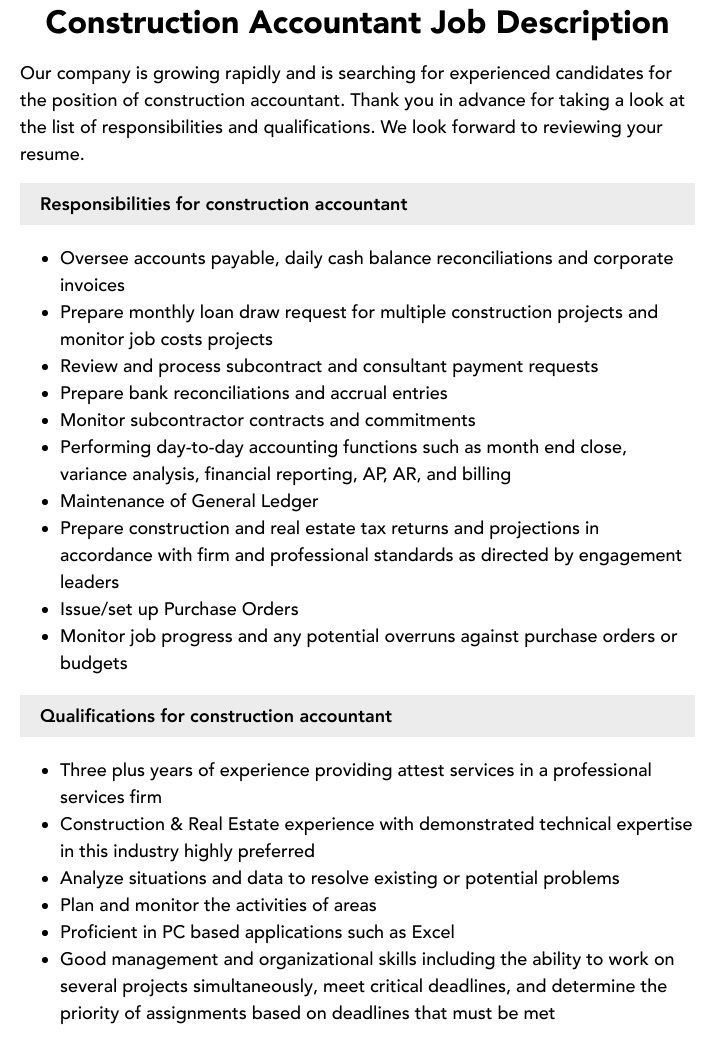The Main Principles Of Pvm Accounting
The Main Principles Of Pvm Accounting
Blog Article
Some Ideas on Pvm Accounting You Need To Know
Table of ContentsRumored Buzz on Pvm AccountingThe Greatest Guide To Pvm AccountingPvm Accounting Things To Know Before You Get ThisPvm Accounting Things To Know Before You Get ThisA Biased View of Pvm AccountingAbout Pvm AccountingTop Guidelines Of Pvm AccountingThings about Pvm Accounting
Among the main factors for applying audit in building and construction tasks is the requirement for financial control and administration. Construction projects frequently need substantial financial investments in labor, materials, tools, and various other sources. Correct accountancy allows stakeholders to monitor and take care of these economic resources efficiently. Audit systems provide real-time insights right into job costs, earnings, and productivity, enabling task supervisors to without delay determine prospective concerns and take restorative activities.
Accountancy systems allow firms to check cash circulations in real-time, ensuring sufficient funds are offered to cover expenditures and satisfy financial responsibilities. Efficient money flow administration aids prevent liquidity dilemmas and maintains the task on the right track. https://canvas.instructure.com/eportfolios/2921746/Home/Navigating_the_Maze_of_Construction_Accounting_A_Comprehensive_Guide. Construction projects go through numerous financial mandates and reporting needs. Appropriate accountancy makes sure that all monetary transactions are recorded accurately and that the task follows bookkeeping requirements and legal agreements.
Get This Report about Pvm Accounting
This reduces waste and enhances task effectiveness. To better comprehend the value of bookkeeping in construction, it's likewise essential to identify between building management accounting and task administration bookkeeping.
It focuses on the monetary aspects of private building projects, such as expense estimate, price control, budgeting, and capital monitoring for a particular job. Both kinds of bookkeeping are essential, and they match each other. Building and construction management accountancy makes sure the firm's financial wellness, while job monitoring audit ensures the financial success of specific projects.
Pvm Accounting Fundamentals Explained

A vital thinker is called for, that will certainly function with others to make decisions within their locations of obligation and to surpass the areas' work processes. The setting will communicate with state, university controller team, campus department personnel, and academic scientists. He or she is expected to be self-directed once the first discovering contour relapses.
The smart Trick of Pvm Accounting That Nobody is Discussing
A Construction Accounting professional is responsible for managing the monetary aspects of building and construction jobs, including budgeting, cost monitoring, financial coverage, and conformity with governing requirements. They function very closely with task supervisors, professionals, and stakeholders to make sure exact financial records, expense controls, and prompt payments. Their know-how in building and construction accounting concepts, project costing, and monetary analysis is crucial for effective financial administration within the building and construction market.

The Pvm Accounting PDFs
As you have actually probably learned by currently, tax obligations are an unavoidable part of doing company in the link USA. While a lot of focus generally rests on government and state revenue taxes, there's likewise a third aspectpayroll taxes. Payroll taxes are tax obligations on an employee's gross wage. The revenues from pay-roll taxes are used to money public programs; thus, the funds gathered go directly to those programs as opposed to the Irs (INTERNAL REVENUE SERVICE).
Note that there is an added 0.9% tax for high-income earnersmarried taxpayers that make over $250,000 or solitary taxpayers transforming $200,000. There is no company match for this added tax. Federal Unemployment Tax Obligation Act (FUTA). Revenues from this tax obligation approach government and state joblessness funds to help employees that have shed their jobs.
Pvm Accounting Fundamentals Explained
Your deposits should be made either on a month-to-month or semi-weekly schedulean election you make before each fiscal year. Regular monthly settlements. A monthly payment should be made by the 15th of the adhering to month. Semi-weekly payments. Every other week down payment dates depend upon your pay timetable. If your cash advance falls on a Wednesday, Thursday or Friday, your deposit schedules Wednesday of the adhering to week.
Take treatment of your obligationsand your employeesby making total payroll tax payments on time. Collection and settlement aren't your only tax duties.
The smart Trick of Pvm Accounting That Nobody is Discussing

States have their own payroll taxes as well. Every state has its very own unemployment tax (called SUTA or UI). This tax obligation price can vary not only by state but within each state as well. This is due to the fact that your business's industry, years in organization and joblessness background can all identify the portion used to determine the amount due.
Pvm Accounting Can Be Fun For Anyone
The collection, remittance and reporting of state and local-level taxes depend on the governments that levy the tax obligations. Plainly, the topic of pay-roll tax obligations entails plenty of moving parts and covers a broad array of accountancy knowledge.
This site uses cookies to improve your experience while you navigate with the site. Out of these cookies, the cookies that are classified as required are saved on your web browser as they are vital for the working of standard capabilities of the web site. We also use third-party cookies that assist us evaluate and understand how you use this site.
Report this page